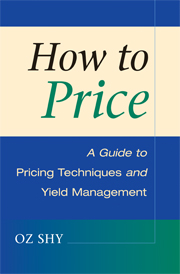Book contents
- Frontmatter
- Contents
- Preface
- 1 Introduction to Pricing Techniques
- 2 Demand and Cost
- 3 Basic Pricing Techniques
- 4 Bundling and Tying
- 5 Multipart Tariff
- 6 Peak-load Pricing
- 7 Advance Booking
- 8 Refund Strategies
- 9 Overbooking
- 10 Quality, Loyalty, Auctions, and Advertising
- 11 Tariff-choice Biases and Warranties
- 12 Instructor and Solution Manual
- References
- Index
7 - Advance Booking
Published online by Cambridge University Press: 06 July 2010
- Frontmatter
- Contents
- Preface
- 1 Introduction to Pricing Techniques
- 2 Demand and Cost
- 3 Basic Pricing Techniques
- 4 Bundling and Tying
- 5 Multipart Tariff
- 6 Peak-load Pricing
- 7 Advance Booking
- 8 Refund Strategies
- 9 Overbooking
- 10 Quality, Loyalty, Auctions, and Advertising
- 11 Tariff-choice Biases and Warranties
- 12 Instructor and Solution Manual
- References
- Index
Summary
Service providers, particularly providers of services related to travel, engage in advance booking that use a wide variety of advance reservation systems. From consumers' perspective, this practice seems to be beneficial for the following two reasons:
Value of time and capacity constraint: Advance reservations save considerable amount of time for consumers as otherwise they would have to travel several times to the theater, airport, train station, or hotel, just to find out that these services may have already been fully booked.
Purchase of complementary services: Travel arrangements almost always consist of a wide variety of complementary services that must be booked from multiple providers (flights, trains, hotels). In addition, travelers must alter their work schedule, which may include asking for vacation time or a leave of absence. Advance reservations ensure the fulfilment of these multiple obligations at the same time.
Whereas both of the above examples demonstrate why advance booking is beneficial to consumers, the purpose of this chapter is to show that advance booking also enhances the profit of service providers. Moreover, this chapter suggests several algorithms under which advance booking becomes the major strategic tool for making YM most profitable. Perhaps the most interesting feature of advance reservation systems is that they can be used to identify and sort consumers according to their willingness to pay without having to formally ask them to reveal their preferences.
- Type
- Chapter
- Information
- How to PriceA Guide to Pricing Techniques and Yield Management, pp. 227 - 264Publisher: Cambridge University PressPrint publication year: 2008

